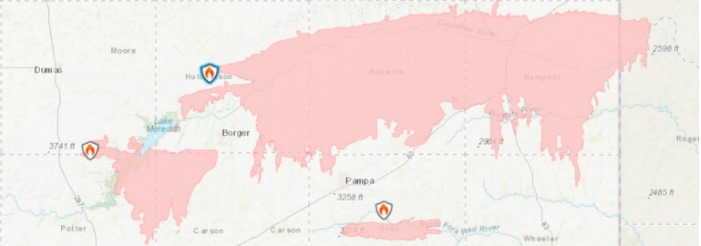By Ryan Hanrahan
The Texas Tribune’s Jayme Lozano Carver reported this past Friday that estimates from recent wildfires in the Texas Panhandle “show more than 7,000 head of cattle died. The final number directly related to the fires could reach 10,000. The true total may not be known for months, as ranchers consider euthanizing cattle with severe injuries such as burnt hooves and udders. Ranchers are also being advised to watch for respiratory issues in their cattle.”
“‘Their hooves are burned off, their utters are burnt beyond – they can’t nurse their babies,'” Texas Ag Commissioner Sid Miller told CBS News. “‘We’ll actually end up having to put a lot of cattle down just because they won’t be able to make it, even though they survived.'”
“The fires also broke out during calving season, a very vulnerable time on pastures,” Carver reported. “‘Unfortunately, many of the livestock that were killed are either cows with their calves, or pregnant cows,’ said Arthur Uhl, president of the Texas and Southwestern Cattle Raisers Association.”

Map of recent Texas Panhandle wildfires. Courtesy of the National Wildfire Coordinating Group.
Largest Fire Now 100% Contained
While there were numerous wildfires in the Texas Panhandle over the past few weeks, the largest was the Smokehouse Creek Fire, which is now completely contained, according to reporting from the Dallas Morning News’ Lana Ferguson on Sunday.
“The blaze, sparked Feb. 26 in Hutchinson County near Stinnett, quickly became the largest wildfire in state history and among the largest in U.S. history,” Ferguson reported. “A cluster of wildfires in the region burned across several counties, killing at least two people and destroying hundreds of homes.”
The Texas A&M Forest Service reported Sunday evening that the Smokehouse Creek Fire burned 1,058,482 acres across nearly three weeks. The smaller Windy Deuce, Wellhouse, Grape Vine Creek and Mills Creek fires — all in the Texas Panhandle — burned a combined 179,000 acres, but were also reported as 100% contained by the Texas A&M Forest Service.
“State investigators concluded the Smokehouse Creek and Windy Deuce fires were ignited by power lines, according to the forest service,” Ferguson reported. “Minnesota-based utility provider Xcel Energy said in a March 7 statement that its facilities appeared to have been involved in igniting the Smokehouse Creek fire. In the same statement, the company said it did not believe its facilities played a role in the Windy Deuce fire.”
Fire Also Destroyed Crucial Resources
CBS News’ Li Cohen reported that “cattle that have survived the blazes relatively unscathed are still suffering, as are their owners, as the fires took out essential resources. Of the primary five fires that have burned over the past two weeks, four are in the Canadian River Basin, Miller said, a region that he says is mostly canyons and grazing land. Roughly 120 miles of powerlines have been burned down in the fires, and seven grain and seed dealers were “completely wiped out.”
“Even the burned grass poses a problem, as the cattle industry heavily relies on healthy pastures,” Cohen reported. “Miller said he believes it will take at least two years for grasses to return to where they were, and that, on top of everything else, means many ranchers will likely have to completely change their future plans, with some even getting rid of their surviving cattle.”
“Relief efforts in the region are ongoing,” Carver reported. “The U.S. Small Business Administration has set up disaster loan outreach centers in Canadian and Borger for people affected by any of the wildfires that hit the Panhandle. The State Agriculture Relief Fund, administered by the state office, also received more than $800,000 in donations for farmers and ranchers devastated by the fires. Areas to donate livestock supply have been established throughout the Panhandle.”
Source : illinois.edu